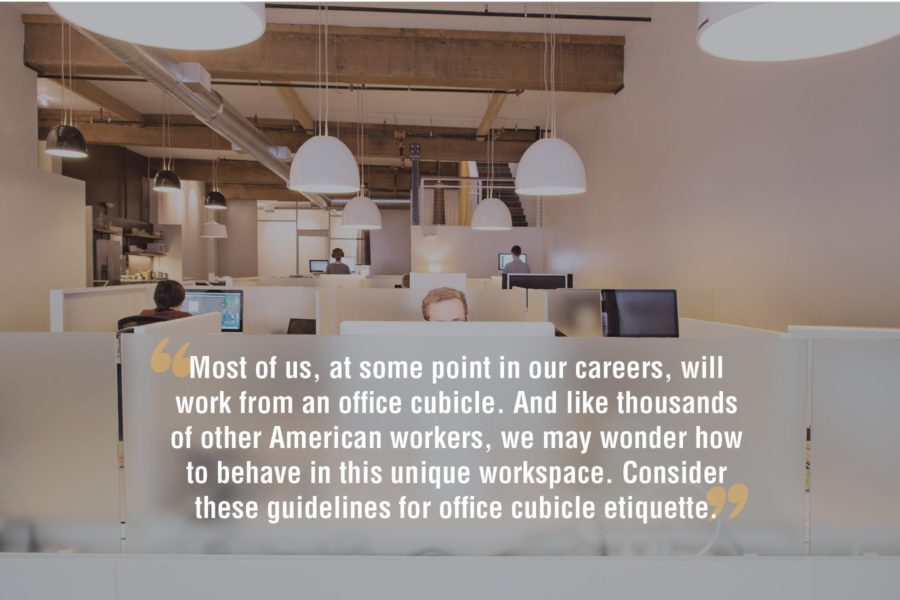Office cubicles debuted in the 1960s when designer Robert Probst introduced them as a solution to a corporate conundrum: confined offices. Strangely enough, according to history, he intended to make offices breezier, less packed and more efficient. However, some argue that he created a corporate monster, giving rise to the need for office cubicle etiquette.
Most of us, at some point in our careers, will work from an office cubicle. We’ll stuff our personal belongings in the desk drawer, sit down with our coffee mug or water bottle and click on our computer to work. Every few hours, we’ll glance lovingly at a candid photo of a loved one hanging on the soft fabric of our cubicle wall.
And like thousands of other American workers, we may wonder how to behave in this unique workspace. Consider these guidelines for office cubicle etiquette and share them with your team.
Respect Privacy
Before the implementation of cubicles, chunky wooden desks and ornate chairs peppered 1950’s office spaces. What’s more, billowing cigarette smoke and impersonal workspaces were the norms. Searching desk surfaces or drawers for a stapler or a push pin wasn’t anything abnormal.
However, when we moved from desks to cubicles, unspoken privacy rules changed. Cubicles enabled personal expression and more privacy than the open-office designs of the past.
Office cubicle etiquette supports healthy respect for privacy — no more digging around someone else’s space, for example. Although cubicles do have an air of openness, each cubicle and its items belong to the worker inhabiting the area.
In other words, please don’t trespass in a co-worker’s cubicle without permission. Respect that individual’s privacy by maintaining your distance until invited in.
Avoid Interruptions
Many employees enjoyed the office design transition as cubicles were ushered in and openness was ushered out of the office. Not only did cubicles lend more room to focused concentration, but they also prevented unnecessary interruptions.
Keep in mind; most cubicle walls range from four to six feet tall and are made of thin material. Even with the noise-penetrating surface, cubicle walls still work effectively as boundaries. Workers found themselves being interrupted less by their co-workers or bosses merely because they were behind the safety of their defined workspace.
This trend must be ongoing for cubicles to remain successful. Try to practice office cubicle etiquette by not interrupting your office neighbors. Use other communication methods to convey your message of being unavailable.
For example, create a note to hang on your cubicle reading you’re busy at the moment. And instead of tapping someone’s shoulder, leave a message on their cubicle or desk, requesting their attention to a specific matter.
Keep Noise in Check
Bad roommates are often akin to less-than-ideal cubicle neighbors. Playing loud music in the middle of the night is just one example of the lousy roommate syndrome.
Regarding cubicle neighbors, this syndrome frequently manifests itself in talking over speakerphone, playing loud music or annoying habits (i.e., pencil tapping, bubble gum popping or humming). If you’re like most of us, you’ve had to endure a cubicle neighbor (or two) with some of these frustrating habits.
In practicing office cubicle etiquette, consider what other people hear from your space. Is your music at a reasonable level, or could you use earbuds instead of the radio? Take an honest inventory of your quirks. Do you have any habits that have been issues in the past? While we’re all unique individuals, we must create an environment conducive to productivity and professionalism.
Honor Confidentiality
As mentioned, cubicle walls are typically made of thin, lightweight material. This design approach makes them affordable and easy to move, reducing overall business expenses. Still, your cubicle isn’t always the one workspace you have to conduct your personal affairs.
We’re only human, after all, and our lives continue around the clock. We might receive a medical update from a health care provider or a call from the school nurse during the workday. Having these intimate and sometimes confidential conversations in our office cubicle can leave too much room for straining ears and office gossip.
Honor your confidentiality by moving to an empty meeting room or going outside to take personal phone calls. This approach protects your privacy, and it prevents others from being tempted to chatter.
Be Mindful of Smell Sensibilities
Most workers report that being near the office kitchen or break room was undoubtedly the worst possible location for a cubicle. The smell of leftover lasagna at 9:30 in the morning doesn’t do much for work productivity (or positivity).
That said, remember that smells can travel significantly and can impact individuals differently. Your cubicle neighbors might not enjoy the smell of your lunch as much as you enjoy eating it at your desk.
Additionally, many people are susceptible to smells. Some individuals even suffer from allergies or mental health disorders triggered by scents, such as post-traumatic stress disorder. While we can’t eliminate all of our smells, we can practice personal hygiene, avoid wearing heavy perfumes and colognes and be mindful of the smells coming from our cubicle.
Maintain Good Professional Relationships
Some of the relationships we develop at work will travel with us throughout our entire lifetime, while others are only for a single chapter. It’s our job to nurture these professional relationships, no matter their duration.
Besides, human beings are intrinsically social. Even with different personalities — introverts and extroverts — we need each other to survive and thrive. Building good relationships is a fundamental part of office cubicle etiquette, although it’s often overlooked.
This approach doesn’t mean that we need to become best friends with our cubicle neighbors. However, it would be best to encourage trust, respect, inclusion and open communication with the individuals we work beside every day.
Of course, this strategy is easier said than done. For starters, try to become more self-aware, taking responsibility for your words and actions. Build on that by incorporating more honest and sophisticated communication. Little by little, you’ll develop valuable working relationships that will benefit you and the entire office.
Looking for new ways to cultivate a healthy workplace?
Contact us – our employee benefits, workplace wellness and HR services teams are here to help you keep your teams inspired.





